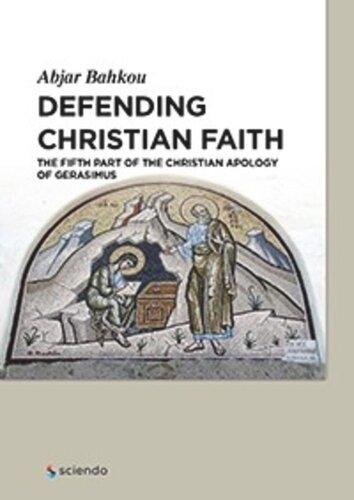

Most ebook files are in PDF format, so you can easily read them using various software such as Foxit Reader or directly on the Google Chrome browser.
Some ebook files are released by publishers in other formats such as .awz, .mobi, .epub, .fb2, etc. You may need to install specific software to read these formats on mobile/PC, such as Calibre.
Please read the tutorial at this link: https://ebookbell.com/faq
We offer FREE conversion to the popular formats you request; however, this may take some time. Therefore, right after payment, please email us, and we will try to provide the service as quickly as possible.
For some exceptional file formats or broken links (if any), please refrain from opening any disputes. Instead, email us first, and we will try to assist within a maximum of 6 hours.
EbookBell Team

4.8
34 reviewsOpen Access
The book by Abjar Bakhou presents Medieval Christian author Gerasimus and his discussion with Islam. His aim was to show that Christian teachings are not irrational, but rather subtle and complex. As a Christian philosopher and theologian, Gerasimus used the experiences of those of the past to facilitate his own response to critics. However, two important differences separated him from earlier apologists, which demand his own insight and innovation. First, the new language of intellectual discourse was Arabic, which was not accommodating for expressing traditional Christian doctrine, and required the development of a vocabulary out of terms already heavily influenced by the Qur'anic worldview. Second, the new religion challenging Christianity was one of absolute monotheism, which shared neither a common scriptural nor cultural heritage, and rejected the very possibility of a Trinity and Incarnation.
Although a common theme in early Christian apologetics was the refutation of Judaism, the debate generally centered on the interpretation of the Old Testament, showing that Jesus was indeed the Messiah. The Qur'an, while acknowledging Jesus as the Messiah, explicitly rejects the Christian doctrines of the Incarnation and the Trinity, and presents itself as the revelation, which supersedes all previous revelation. Thus, although Christians and Muslims share certain themes and figures (such as Creation and the Last Judgement, Abraham, Moses, Mary and Jesus), Muslims refuse evidence contrary to the Qur'an, leaving Christians without recourse to traditional scripture-based arguments. Gerasimus, as a Christian apologist and mutakallim, accepted these challenges and began the process of explaining and translating his faith in the new milieu to make it coherent and rational. In his treatise, Gerasimus reveals himself to be a full participant in this important period of intellectual history; he sets down the basic points of controversy and outlines a response to them in a form that would be an excellent introduction to Christian theology written for the Muslim environment.
Gerasimus was also a mutakallim in his own right, the Christian counterpart to those Islamic scholars who sought to defend their faith through rational arguments. In an effort to argue the legitimacy of Christianity, Gerasimus attempts to create a common language that influences the meaning of terminology and concepts of intellectual development in Muslim - Christian debates. Such language would set the stage for centuries to come. This is certainly his greatest contribution.
Medieval Arab Christians and Muslim Debates